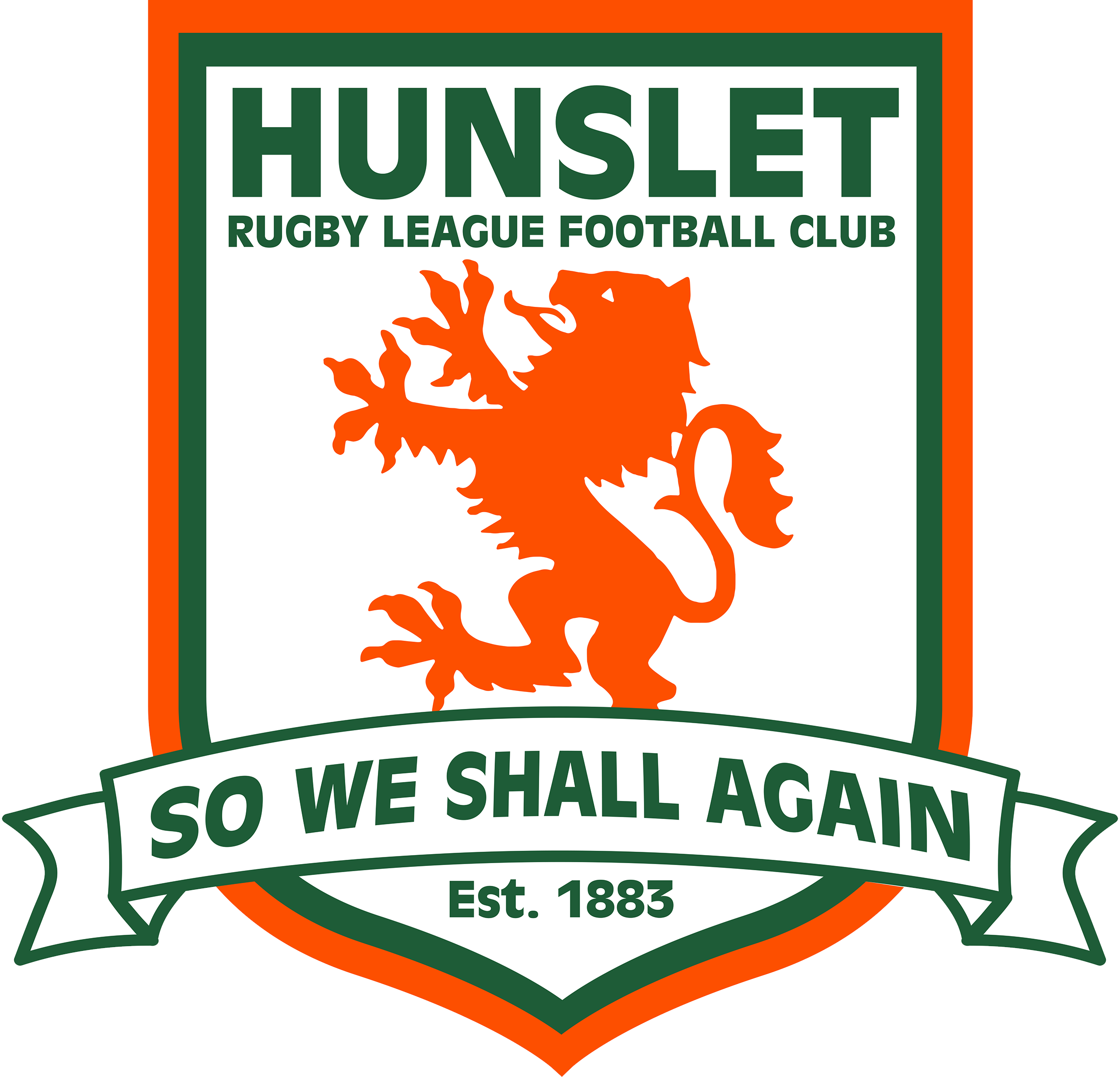YOU can’t keep a gud ‘un away!
That’s certainly the case with Hunslet’s Ian Johnson who after a decade or so of tremendous service as a director – including a productive stint as chairman – is stepping down from the board.
No one who knows him, though, will be surprised to learn that Ian, whose title in recent years has been operations director, will still be around the South Leeds Stadium on matchdays for the foreseeable future, helping his successor (or, more likely, successors) complete the myriad duties that he had tirelessly taken on for the Parksiders, including during the fraught period of lockdown restrictions.
He is being made a Vice President of Hunslet RLFC in recognition of his remarkable loyalty and his sustained contribution, without which the club might not feasibly exist.
His work on the Parksiders’ behalf has been undertaken despite the fact that he and his family (all of whom are equally committed) opened a restaurant, situated by the canal in Shipley, several years ago. That venture has, happily, proved to be a resounding success but, given that there are only so many hours in the day, something’s had to give and it’s with a heavy heart that he formally resigned as a director at the end of February.
But myrtle, flame and white – and chocolate and white – runs through his bones, and not surprisingly, given that he has followed Hunslet for almost six decades, having first been taken to games by his dad, Frank.
He says: “I’m not entirely sure which is the first match I saw. The first I can remember is the 1965 Challenge Cup semi-final against Wakefield Trinity at Headingley, which of course we won.
“I went to Wembley for that great final against Wigan. I was only ten years old so my memory is hazy but what’s stuck in my mind down the years was the big crowd. Seeing the famous twin towers for the first time was fantastic, and I also remember my mum asking, when Wigan’s Laurie Gilfedder landed that early penalty after Alan Marchant had booted the ball out on the full at the start, `are they kicking off?’
“The journey to Wembley, in those days before the M1, was pretty horrendous. We travelled down the A1 in our family car every year and stayed with relatives near what is now Milton Keynes before going on, on the day of the final, to Southall, where we’d pick up more relatives. There’d be eight or so of us in a four-seater car, which was how it was in those days. That annual trip was an adventure in itself, I’ve a vivid memory of chasing rabbits just off the M1 once.
“My dad was a long-standing Hunslet supporter and had been brought up on Milnes Grove, which is now demolished, just off Dewsbury Road, and had attended Bewerley Street School.
“I regularly watched Hunslet with him while, often, I’d catch the 46 bus with my brother Gary from where we lived in Armley, get off at the old Blooming Rose pub on Hunslet Moor, and walk up to Parkside from there. If we got to the ground early enough we’d man the old scoreboard at Mother Benson’s End. Good Friday matches against Leeds are a special memory – they were always a real event at Parkside and I also remember how a lady, who was almost an auntie, from the Girl Guides, which my mum was heavily involved with, would call at our house before we went to games to give us helpings of beef curry and rice which, back in those days, was the Vesta pre-cooked version. I went to a lot of home games (I think I was a season ticket holder), but not too many away matches.”
Then, around thirteen years ago, came the seachange. “I was happy to simply support Hunslet from the terraces until around 2009, when I became more involved, through my daughter Nicola,” Ian reveals. “At around that time we had a marketing manager, Liz Clements, who launched a cheerleaders group, and Nicola wanted to be part of it. It came out, in conversation with Liz, that I was involved in producing a web site at BT, for whom I worked. Hunslet were seeking to do something similar, and I got sucked into the club through that.
“Not long afterwards, somehow, a couple of very active supporters, John Hawksworth and Brian Smith had a word with the board and chairman Graeme Liles and his board invited me to join, together with a number of other active volunteers. That will have been around 2011 or 2012. From that point we started to go to away games as a family more consistently. Grahame Liles, our chairman, didn’t particularly like standing up and making speeches and I was asked to take on that role, as making presentations was something I was used to doing at work – it’s about `learned competence’. Our director Chris Batty would give me marks out of ten – and those marks varied considerably!
“That put me in the limelight, though, and I soon learned that the saying `don’t go on holiday’ has some truth in it. When I came back from one I found that, while I was away, Grahame had stepped down as chair and that I’d been volunteered, in my absence, to succeed him. It was a massive honour in truth and not one, given my loyalty to Hunslet, that I could turn down.
“It was a difficult time, though. Grahame, who had pumped so much of his own money into Hunslet, was understandably no longer willing to fund the club as he had done in the past, and we were desperately short of cash. At the same time my workload in my regular job was increasing, so things were getting difficult personally. I was having to make calls to the Inland Revenue on behalf of Hunslet, which wasn’t really my forte. We were on a knife-edge financially; Roy Sampson, who was coach when I became chair, was very understanding and that’s been the case with all his successors, but they remain difficult conversations. We can’t match many other clubs in terms of the match terms we can offer, and you can understand it when some players say `why should I train three times a week when I can get more money elsewhere?’
“To a degree the problems we had back then remain; we lack certain skill-sets at the club that we really do need to have in place if we are to successfully sell Hunslet RLFC to sponsors.
“It takes something special to make Hunslet a good business proposition for potential sponsors, in addition to which the south Leeds community of old has been decimated. But the club has a very proud history, and continues to make a big contribution, not only by providing entertainment on the field of play but in many other ways, including a great deal of development work by Michael Nuttall in local schools. Unfortunately we’ve not been good at broadcasting what we can bring to the city, and we have to keep pumping these things out. Marketeers, I believe, will tell you something has to be said seven times before it starts to sink in.”
Despite the problems of juggling leading Hunslet RLFC with his growing responsibilities at BT, Ian thoroughly enjoyed his being at the helm. He reflects: “I took great pride in being chair, albeit it was tinged with a sense of not being accepted. There seemed to be an element of fans who, before the days of us being supporter-owned, didn’t really appreciate how dire the situation was financially. All they saw, I think, was a supporter who had no money coming in as chairman.
“In addition, I came in blind regarding any knowledge of networks, and about how to get things done, and I couldn’t always attend RFL meetings because of my work. We were well-meaning but not always fully understanding of what was needed in running a business. I found that it was important, as a chairman, to divorce the business side from being a supporter, and I had a lot of sleepless nights about paying the wages of the players. So it was quite a relief when Grahame Liles got in touch with Steve Ball, who had been a successful chairman of Batley and who had plenty of contacts.”
Hunslet – who at that time operated as the Hawks – still struggled financially, though. Ian recalls: “It was two years into Steve’s tenure as chairman that I spoke to him ahead of a game against Workington, which we needed to win to gain promotion. If we didn’t win that game we would be on a knife-edge regarding our very survival. Like so many other clubs we’d fallen into the trap of spending money to secure promotion, which isn’t of course guaranteed. Happily, we survived!”
Ian Johnson’s potential successors will be interested to learn that, as operations director, dealing with match-day matters and other issues, prior to opening his restaurant, about six years ago, he would usually be at training, picking up on the many things that needed to be done, for example arranging alternative facilities if required. “It’s a hand-on role,” he reveals, “for example, for the Harry Jepson OBE Memorial Trophy game against Leeds earlier this year, I was down at the South Leeds Stadium at 7.30am to cordon off the car park as there was a swimming gala on in the John Charles Centre. The first words the duty office said to me were, `the pitch is waterlogged’. There hasn’t been a fulltime groundsman at the stadium for a couple of years so, after dealing with the car park, I went home for a bit to eat, got changed into some old clobber, came back and forked the pitch.
“It was similar the previous year, for the friendly against Bradford, when then-coach Gary Thornton, kitman Trevor Brown and my son Scott, who does match-day videos among much else, also got down to help. Games have to go on, not least in the case of the Leeds match because we had 200 people coming for the pre-match lunch and hospitality.
“It’s been a matter, in my role, of doing whatever it takes. For example during the covid lockdowns I got down to the ground at 9.30am, cordoning off `red’ zones, and dealing with the required documentation, and generally picking up the pieces and liaising with the Rugby Football League on their requirements, which for the last couple of years has been time consuming.”
So it’s au revoir, but not goodbye by any means. Ian concludes: “I’ve opted to step down through a culmination of several things. Our restaurant’s getting busier, I get two days off but that’s effectively gone back to half a day through my involvement with Hunslet.
“Match-days and meetings take up more time, which adds to the pressure on me and on my family – and I’m not getting any younger.
“A few things cropped up earlier in the season which made me think that the time’s right for me to reassess, but the main thing is that I need more time to focus properly on the restaurant, which takes up 12-14 hours a day, five days a week. It’s time to pass on the baton to someone with more energy and, hopefully, with fresh ideas.”
Chairman Kenny Sykes said: “While I’m very sorry that Ian is stepping down, it’s fantastic – and typical of the man – that he will remain involved at Hunslet and will help and guide those who will take on his many duties.
“We will be delighted to make him a Vice President of the club and it’s an accolade that’s richly deserved. He has always been very helpful and supportive, including to me personally, and I hope he’ll enjoy being able to simply watch matches, and to spending more time with his wife Dianne.”



Thank you for all your hard work Ian.
Thank you Ian for your wonderful service to our great club ! And so you will again
Best wishes
Stuart Keane
Ian you deserve a big thank you for all your hard work and commitment to Hunslet RLFC. A great club with a great history, long may it continue.
Enjoy your new Vice President role.
All the best!